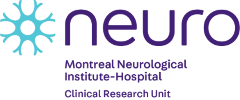Neuro-oncologie (tumeur cérébrale)
Pour plus d’informations sur les essais cliniques sur la tumeur cérébrale, veuillez contacter Salma Khalil.
Études actuelles en recrutement
Pour plus d’informations en français, veuillez contacter info-CRU.neuro@mcgill.ca
From clinicaltrials.gov
Glioblastoma (GBM) adaptive, global, innovative learning environment (GBM AGILE) is an international, seamless Phase II/III response adaptive randomization platform trial designed to evaluate multiple therapies in newly diagnosed (ND) and recurrent GBM.
De clinicaltrials.gov. Malheureusement, les informations ne sont disponibles qu’en anglais. Pour plus d’informations en français, veuillez contacter Salma Khalil.
The purpose of this study is to compare the efficacy and safety of eflornithine in combination with lomustine, compared to lomustine taken alone, in treating patients whose anaplastic astrocytoma has recurred/progressed after radiation and temozolomide chemotherapy.
This study will consist of 4 study periods of up to 50 months in total, consisting of:
Screening Period – A maximum screening duration of 4 weeks.
Treatment Period – Treatment Arm A up to 24 months; Treatment Arm B up to 12 months.
End of Treatment Visit – A minimum of 4 weeks post last treatment for both arms.
Follow-Up Period – Up to 24 months.
A total of approximately 280 patients will be randomized in a 1:1 ratio to receive either eflornithine + lomustine or lomustine alone.
De clinicaltrials.gov. Malheureusement, les informations ne sont disponibles qu’en anglais. Pour plus d’informations en français, veuillez contacter Salma Khalil.
INTRAGO II resembles a multicentric, prospective, randomized, 2-arm, open-label clinical phase III trial which tests if the median progression-free survival (PFS) of patients with newly diagnosed glioblastoma multiforme (GBM) can be improved by the addition of intraoperative radiotherapy (IORT) to standard radiochemotherapy.
Études à venir
Pour plus d’informations en français, veuillez contacter info-CRU.neuro@mcgill.ca
From clinicaltrials.gov:
Study AG881-C-004 is a phase 3, multicenter, randomized, double-blind, placebo-controlled study comparing the efficacy of AG-881 to placebo in participants with residual or recurrent Grade 2 glioma with an IDH1 or IDH2 mutation who have undergone surgery as their only treatment. Participants will be required to have central confirmation of IDH mutation status prior to randomization. Approximately 366 participants are planned to be randomized 1:1 to receive orally administered AG-881 40 mg QD or placebo.
Pour plus d’informations en français, veuillez contacter info-CRU.neuro@mcgill.ca
CCTG CEC6 is a phase III trial designed for patients with 1p/19q co-deleted and IDH mutated Anaplastic Glioma or Low Grade Glioma.
Pour plus d’informations en français, veuillez contacter info-CRU.neuro@mcgill.ca
Merck 3475-05A is a phase II trial that will enroll patients with recurrent and resectable IDH wild-type Glioblastoma
Pour plus d’informations en français, veuillez contacter info-CRU.neuro@mcgill.ca
HABS is a phase II study for patients with Breast Cancer, Melanoma & Lung Cancer Brain Metastases with minimally invasive histopathology. This clinical trial proposes withholding stereotactic radiosurgery (SRS) from a subset of patients with surgically resected brain metastases that may not benefit from it.
Études actives (ne recrutent pas)
De clinicaltrials.gov. Malheureusement, les informations ne sont disponibles qu’en anglais. Pour plus d’informations en français, veuillez contacter Salma Khalil.
The purpose of this study is to evaluate patients with glioblastoma that is MGMT-methylated (the MGMT gene is altered by a chemical change). Patients will receive temozolomide plus radiation therapy. They will be compared to patients receiving Nivolumab in addition to temozolomide plus radiation therapy.
De clinicaltrials.gov. Malheureusement, les informations ne sont disponibles qu’en anglais. Pour plus d’informations en français, veuillez contacter Salma Khalil.
The purpose of this study is to evaluate patients with glioblastoma that is MGMT-unmethylated (the MGMT gene is not altered by a chemical change). Patients will receive Nivolumab every two weeks in addition to radiation therapy, and then every four weeks. They will be compared to patients receiving standard therapy with temozolomide in addition to radiation therapy.
De clinicaltrials.gov. Malheureusement, les informations ne sont disponibles qu’en anglais. Pour plus d’informations en français, veuillez contacter Salma Khalil.
The primary purpose of the study is to determine the efficacy of an investigational therapy called DCVax(R)-L in patients with newly diagnosed GBM for whom surgery is indicated. Patients must enter screening at a participating site prior to surgical resection of the tumor. Patients will receive the standard of care, including radiation and Temodar therapy and two out of three will additionally receive DCVax-L, with the remaining one third receiving a placebo. Patients randomized to the placebo arm will have the option to receive DCVax-L in a crossover arm upon documented disease progression. (note: DCVax-L when used for patients with brain cancer is sometimes also referred to as DCVax-Brain)
This Phase III trial is designed to evaluate the impact on disease progression and survival time, as well as safety, in patients following treatment with DCVax(R)-L, an immunotherapy treatment for GBM. The experimental therapy uses a patient’s own tumor lysate and white blood cells from which precursors of the dendritic cells are isolated. The dendritic cell is the starter engine of the immune system. The white cells are then made into dendritic cells and they are educated to « teach » the immune system how to recognize brain cancer cells. Eligible patients will receive a series of injections of DCVax-L, to activate and then boost the immune response to the tumor cells.
The primary study endpoint is PFS (progression free survival), and the first secondary endpoint is overall survival (OS). Other endpoints include performance status, immune response, and also safety. Interim analyses to assess efficacy are incorporated in the trial design.
Side effects reported from early trials are mostly mild, and may include skin reactions of redness, pain, swelling at the injection site.
De clinicaltrials.gov. Malheureusement, les informations ne sont disponibles qu’en anglais. Pour plus d’informations en français, veuillez contacter Salma Khalil
